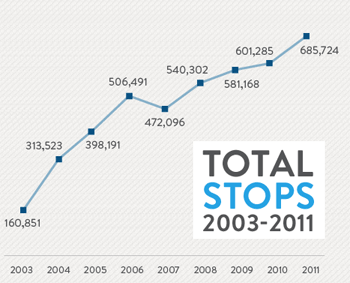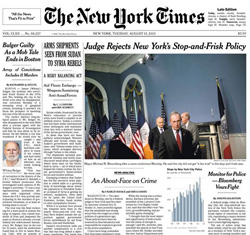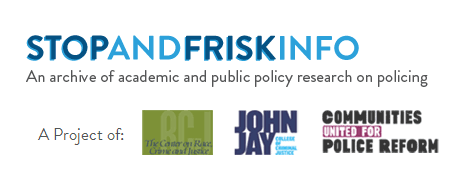Judge Rules NYPD Stop-and-Frisk Practices Unconstitutional, Racially Discriminatory
Resource type: News
The Atlantic Philanthropies |
In a historic ruling on 12 August 2013, a federal judge found the New York City Police Department (NYPD) stop-and-frisk practices — which entail temporarily detaining people on the street, questioning them, and possibly also frisking or searching them — unconstitutional and racially discriminatory.
This legal victory is the culmination of two class action lawsuits led by Atlantic grantees: the Center for Constitutional Rights and the New York Civil Liberties Union. Although this ruling does not require the NYPD to end the practice, the judge did order significant reforms, including a federal monitor and body-worn cameras for some patrol officers.
The Human Impact of Stop-and-Frisk Policies Is Profound
Over the past decade, hundreds of thousands of New Yorkers have been illegally profiled and subjected to humiliating stop-and-frisk experiences each year.
In 2011, the NYPD reported a record 685,724 stops — a 600 per cent increase since 2002. Eighty-four per cent of those stopped were black or Latino, and 88 per cent of the people stopped were neither arrested nor received summonses. Despite the stated purpose of the policy, weapons and contraband were recovered less than 2 per cent of the time.
Stop-and-frisk encounters have serious repercussions that can change the course of people’s lives. A wide range of communities have learned to live in fear of police and a generation of children of colour have grown up in an environment where being mistreated by police is an expected part of daily life. The negative impact of stop-and-frisk practices on communities is outlined in this 2012 report by the Center for Constitutional Rights.
The widespread use of stop-and-frisk in New York City has been part of a larger trend of ever-increasing criminalisation and mass incarceration of blacks and Hispanics that has resulted in high incarceration rates across the United States. In this way, the devastating the effects of stop-and-frisk are also indicative of the larger costs of this national crisis.
Momentum is Building
Atlantic grantees — the Center for Constitutional Rights, New York Civil Liberties Union, the NAACP Legal Defense Fund and Communities United for Police Reform — are among a growing movement of organisations, lawyers, researchers, community members and activists that have joined forces to end discriminatory policing practices in New York and promote public safety and policing practices based on cooperation and respect.
In the Media
Judge Rejects New York’s Stop-and-Frisk Policy
The New York Times, 13 August 2013
A federal judge ruled that the stop-and-frisk tactics of the New York Police Department violated the constitutional rights of minorities in the city, repudiating a major element in the Bloomberg administration’s crime-fighting legacy.
The use of police stops has been widely cited by city officials as a linchpin of New York’s success story in seeing murders and major crimes fall to historic lows.
> Read the full article in The New York Times
As Critics United, Stalled Battle Against Frisking Tactic Took Off
The New York Times, 13 August 2013
The New York Times profiled the rise of Communities United for Police Reform (CPR), a coalition of groups that includes several grantees, and how the group came to shape the conversation around reforming the New York Police Department. “Stop-and-frisk isn’t stopping criminals. It is stopping innocent people,” said Donna Lieberman of the New York Civil Liberties Union, a grantee and member of CPR.
> Read the full article in The New York Times
Get Involved
Join these Atlantic grantees working to end unjust stop-and-frisk policies:
> Communities United for Police Reform
> New York Civil Liberties Union
> Center for Constitutional Rights
Learn More at stopandfriskinfo.org
Center for Constitutional Rights, NAACP Legal Defense and Education Fund, and New York Civil Liberties Union are Atlantic grantees. Communities United for Police Reform is an Atlantic grantee via a re-grant through The Advocacy Fund.



